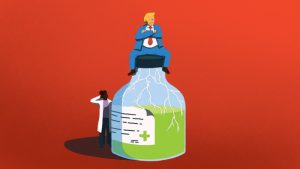surveying the four decades since Aids
Unlock the Editor’s Digest for free
Roula Khalaf, Editor of the FT, selects her favourite stories in this weekly newsletter.
Eighteen months after the first official report of an unusual pneumonia among previously healthy homosexual men in California, a White House reporter asked President Ronald Reagan’s spokesman for his reaction. By that time, the epidemic had affected 600 people. But the response combined ignorance with callous indifference.
“What’s Aids?” said Larry Speakes. “I don’t have it. Do you?” It triggered laughter at the press conference. It took another five years before Reagan, himself, would publicly mention the late stage condition of what, by then, had long been identified as infection by HIV.
In the four decades since, and despite a cumulative global death toll of more than 40mn people (six times more than from Covid-19), there has been remarkable progress in tackling one of the most burdensome communicable diseases of modern times. A vaccine and a cure are still lacking but effective prevention, diagnosis and treatment have sharply reduced the burden.
As Dispatches from the AIDS Pandemic — written by officers of the Centers for Disease Control and Prevention — recalls, political leadership was key. The book begins with Reagan’s inaction and ends with other anti-heroes, including Thabo Mbeki, South Africa’s president, whose embracing of denialists of the causes of Aids may have resulted in more than 330,000 avoidable deaths.
By contrast, the authors also single out more courageous political leaders including George W Bush, who championed the US President’s Emergency Plan for Aids Relief. It sharply accelerated funding for, and focus on, prevention and treatment in Africa.
While the laborious scientific and medical breakthroughs dominate in the writers’ descriptions, they also highlight the role of human leadership more generally. C Everett Koop, Reagan’s surgeon general, for example, spoke out on prevention despite fierce criticism from the White House and beyond. Jonathan Mann, the doctor and campaigner, took on officials at the World Health Organization who were jealous of his autonomy and approach. Others battled for control of funding and decision-making among national and international organisations (on which more detail would have been welcome).
The authors also highlight CDC officials and other expatriates in Africa and Asia, who at times ceded authority to local experts in ways that ensured programmes advanced, despite difficult circumstances. They also stress the essential role of Aids campaigners and communities affected by the disease.
The book provides a useful summary of the advances and controversies over the decades: the spats over which scientists first identified HIV as the cause of Aids; its origins in Africa; the differential impact of its multiple variants; the misunderstandings around the supposedly first infected “Patient 0” in the US (in fact Patient O, for “outside” California); initial resistance to circumcision for prevention; and cautious British versus more aggressive US clinical approaches to prescribing the initial monotherapies.

It highlights tensions including battles in the mid-1990s over screening for HIV, with resistance from the blood collection industry, as well as from “no test is best” activists, who argued diagnosis when no treatment was available would harm patients emotionally and threaten their human rights.
Those who have followed HIV closely over the years may learn little from this book. But the authors’ insider perspective provides useful detail and is a reminder of many lessons that still need to be learnt in tackling disease.
Countries including Russia refuse evidence-based prevention policies such as clean needle exchange for intravenous drug users, for instance. Others in Africa have imposed anti-gay measures, adding to stigma. For all the progress on HIV, the prejudice and cynicism it generates still requires an antidote.
Dispatches from the Aids Pandemic by Kevin M De Cock, Harold W Jaffe and James W Curran. Edited by Robin Moseley, OUP, £22.99
#surveying #decades #Aids







